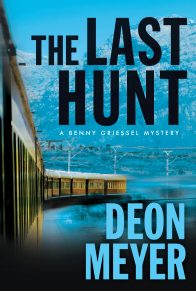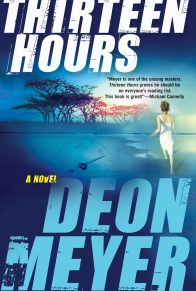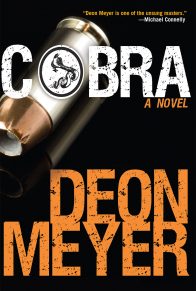M: Secret Service?
W: No.
M: What then?
W: The one that matters.
M: Military Intelligence?
W: There seems to be some misunderstanding, Mr. Mohammed. The message I got was that you are in trouble and you want to improve your position by providing certain information. Is that correct?
[Inaudible]
W: Mr. Mohammed?
M: Yes?
W: Is that correct?
M: Yes.
W: You told the police you would give the information only to someone from the intelligence services?
M: Yes.
W: Well, this is your chance.
M: How do I know they are not listening to us?
W: According to the Criminal Procedures Act, the police must advise you before they may make a recording of an interview.
M: Ha!
W: Mr. Mohammed, do you have something to tell me?
M: I want immunity.
W: Oh?
M: And guaranteed confidentiality.
W: You don’t want Pagad to know you’ve been talking?
M: I am not a member of Pagad.
W: Are you a member of Muslims Against Illegitimate Leaders?
M: Illegal Leaders.
W: Are you a member of MAIL?
M: I want immunity.
W: Are you a member of Qibla?
[Inaudible]
W: I can try to negotiate on your behalf, Mr. Mohammed, but there can be no guarantees. I understand the case against you is airtight. If your information is worth anything, I can”t promise you more than that I do my best. . . .
M: I want a guarantee.
W: Then we must say good-bye, Mr. Mohammed. Good luck in court.
M: Just give me X.
W: I’m calling the detectives.
M: Wait . . .
W: Good-bye, Mr. Mohammed.
M: Inkululeko.
W: Sorry?
M: Inkululeko.
W: Inkululeko?
M: He exists.
W: I don”t know what you’re talking about.
M: Then why are you sitting down again?
OCTOBER
A young man stuck his head out of a minibus taxi, wagging a mocking finger and laughing with wide white teeth at Thobela Mpayipheli.
He knew why. Often enough he had seen his reflection in the big shop windows—a great black man, tall and broad, on the tiny Honda Benly, the motorcycle ineffectively but bravely putt-putting under his weight. His knees almost touching the handlebars, long arms at sharp angles, the full-face crash helmet incongruously top-heavy.
Something of a spectacle. A caricature.
He was self-conscious those first weeks when to add to it all he had to learn to ride the thing. Going to work or home, every morning and afternoon in the rush-hour traffic, he was awkward and unsure. But once he learned the skills, learned to dodge the vans and buses, learned to slip between the gaps in the cars, learned to turn the pitiful horsepower to his advantage, the pointing mocking fingers ceased to trouble him.
And later he began to revel in it: while they sat trapped and frustrated in the gridlocked traffic, he and his Benly buzzed between them, down the long valleys that opened up between the rows of cars.
On the road, from Cape Town, east to Guguletu. And Miriam Nzululwazi.
And Pakamile, who would wait for him on the street corner, then run alongside the last thirty meters to the driveway. Silent, six-year-old solemnity on the wide-eyed face, serious like his mother, patiently waiting till Thobela took off the helmet and the tin work box, swept his big hand over the boy’s head, and said, “Good afternoon, Pakamile.” The child would overwhelm him with his smile and throw his arms around him, a magic moment in every day, and he would walk in to Miriam, who would be busy already with cooking or washing or cleaning. The tall, lean, strong, and beautiful woman would kiss him and ask about his day.
The child would wait patiently for him to finish talking and change his clothes. Then the magic words: “Let’s go farm.”
He and Pakamile would stroll down the yard to inspect and discuss the growth of the past twenty-four hours. The sweet corn that was making cobs, the runner beans (“Lazy housewife, what are you hinting at?” asked Miriam), the carrots, the squashes and butternuts and watermelons trailing along the beds. They would pull an experimental carrot. “Too small.” Pakamile would rinse it off later to show his mother and then crunch the raw and glowing orange root. They would check for insects, study the leaves for fungus or disease. He would do the talking and Pakamile would nod seriously and absorb the knowledge with big eyes.
“The child is mad about you,” she had said on more than one occasion.
He knew. And he was mad about the child. About her. About them.
But first he had to navigate the obstacle course of the rush hour, the kamikaze taxis, the buses belching diesel exhaust, the darting Audis of the yuppies switching lanes without checking their rearview mirrors, the wounded rusty bakkies, pickup trucks of the townships.
First to Pick ‘n’ Pay to buy the fungicide for the butternuts.
Then home.
The director smiled. Janina Mentz had never seen him without a smile.
“What kind of trouble?”
“Johnny Kleintjes, Mr. Director, but you need to hear this yourself.” She placed the laptop on the director’s desk.
“Sit, Janina.” Still he smiled his hearty, charming smile, eyes soft as if gazing on a favorite child. He is so small, she thought, small for a Zulu, small for such a great responsibility. But impeccably dressed, the white shirt a shout in contrast to the dark skin, the dark gray suit an expression of good taste, somehow just right. When he sat like that, the hump, the small deformity of back and neck, could barely be seen. Mentz maneuvered the cursor on the screen to activate the replay.
“Johnny Kleintjes,” said the director. “That old rogue.”
He tapped on the computer keyboard. The sound came tinnily through the small speakers.
“Is this Monica?” Unaccented. Dark voice.
“Yes?”
“Johnny Kleintjes’s daughter?”
“Yes.”
“Then I need you to listen very carefully. Your daddy is in a bit of trouble.”
“What kind of trouble?” Immediate worry.
“Let’s just say he promised, but he couldn’t deliver.”
“Who are you?”
“That I am not going to tell you. But I do have a message for you. Are you listening?”
“Yes.”
“It is very important that you get this right, Monica. Are you calm?”
“Yes.”
Silence, for a moment. Mentz looked up at the director. His eyes were still soft, his body still relaxed behind the wide, tidy desk.
“Daddy says there is a hard drive in the safe in his study.”
Silence.
“Are you getting this, Monica?”
“Yes.”
“He says you know the combination?”
“Yes.”
“Good.”
“Where is my father?”
“He is here. With me. And if you don”t work with us, we will kill him.”
A catch of breath. “I . . . please . . .”
‘stay calm, Monica. If you stay calm, you can save him.”
“Please . . . Who are you?”
“A businessman, Monica. Your daddy tried to trick me. Now you have to put things right.”
The director shook his head ruefully. “Ai, Johnny,” he said.
“You will kill him anyway.”
“Not if you cooperate.”
“How can I believe you?”
“Do you have a choice?”
“No.”
“Good. We are making progress. Now go to the safe and get the drive.”
“Please stay on the line.”
“I’ll be right here.”
The hiss of the electronics. Some static interference on the line.
“When did this conversation take place, Janina?”
“An hour ago, Mr. Director.”
“You were quick, Janina. That is good.”
“Thank you, sir, but it was the surveillance team. They’re on the ball.”
“The call was to Monica’s house?”
“Yes, sir.”
“What data do you think they are referring to here, Janina?”
“Sir, there are many possibilities.”
The director smiled sympathetically. There were wrinkles around his eyes, regular, dignified.
“But we must assume the worst?”
“Yes, sir. We must assume the worst.” She saw no panic. Only calmness.
“I . . . I have the hard drive.”
“Wonderful. Now we have just one more problem, Monica.”
“What?”
“You are in Cape Town, and I am not.”
“I will bring it.”
“You will?” A laugh, muffled.
“Yes. Just tell me where.”
“I will, my dear, but I want you to know, I cannot wait forever.”
“I understand.”
“I don”t think so. You have seventy-two hours, Monica. And it is a long way.”
“Where must I take it?”
“Are you very sure about this?”
“Yes.”
Another pause: long, drawn out.
“Meet me in the Republican Hotel, Monica. In the foyer. In seventy-two hours.”
“The Republican Hotel?”
“In Lusaka, Monica. Lusaka in Zambia.”
They could hear the indrawn breath.
“Have you got that?”
“Yes.”
“Don’t be late, Monica. And don”t be stupid. He is not a young man, you know. Old men die easily.”
The line went dead.
The director nodded. “That’s not all.” He knew.
“Yes, sir.”
She tapped again. The sound of dialing. It rang.
“Yes?”
“Could I talk to Tiny?”
“Who”s speaking?”
“Monica.”
“Hold on.” Muffled, as though someone were holding a hand over the receiver. “One of Tiny’s girlfriends looking for him.”
Then a new voice. “Who’s this?”
“Monica.”
“Tiny doesn’t work here anymore. Nearly two years now.”
“Where is he now?”
“Try Mother City Motorrad. In the city.”
“Thank you.”
“Tiny?” asked the director.
‘sir, we’re working on that one. There’s nothing on the priority list, sir. The number she phoned belongs to one Orlando Arendse. Also unknown. But we’re following it up.”
“There’s more.”
Mentz nodded. She set the program running again.
“Motorrad.”
“Could I speak to Tiny, please?”
“Tiny?”
“Yes.”
“I think you have the wrong number.”
“Tiny Mpayipheli?”
“Oh. Thobela. He’s gone home already.”
“I need to get hold of him urgently.”
“Hold on.” Papers rustled, soft cursing.
“Here’s a number. Just try it.”
“Thank you so much.” The line was already dead.
New call.
“Hullo.”
“Could I speak to Tiny Mpayipheli, please?”
“Tiny?”
“Thobela?”
“He is not home yet.”
“When do you expect him?”
“Who is calling?”
“My name is Monica Kleintjes. I . . . he knows my father.”
“Thobela is usually home by a quarter to six.”
“I must speak to him. It’s very urgent. Can you give me your address? I must see him.”
“We’re in Guguletu. Twenty-one Govan Mbeki.”
“Thank you.”
“There is a team following her and we’ve dispatched another team to Guguletu, sir. The house belongs to a Mrs. Miriam Nzululwazi and I expect that was her on the phone. We will find out what her relationship with Mpayipheli is.”
“Thobela Mpayipheli, also known as Tiny. And what are you going to do, Janina?”
“The tail reports that she is traveling in the direction of the airport. She could be on her way to Guguletu.
As soon as we’re sure, sir, we’ll bring her in.”
The director folded his delicate hands on the shiny desktop.
“I want you to hang back a bit.”
“Yes, sir.”
“Let’s see how this unfolds.”
She nodded.
“And I think you had better call Mazibuko.”
“Sir?”
“Get the RU on a plane, Mentz. A fast one.”
“But, sir . . . I’ve got this under control.”
“I know. I have absolute confidence in you, but when you buy a Rolls-Royce, sometime or other you must take it for a test drive. See if it is worth all the expense.”
“Sir, the Reaction Unit . . .”
He raised a small, fine-boned hand. “Even should they do nothing, I think Mazibuko needs to get out a bit. And you never know.”
“Yes, sir.”
“And we know where the data is going. The destination is known. This creates a safe test environment. A controllable environment.”
“Yes, sir.”
“They can be here in”—the director examined his stainless-steel watch—”a hundred and forty minutes.”
“I’ll do as you say, sir.”
“And I assume the Ops Room will get up and running?”
“That was next on my agenda.”
“You’re in charge, Janina. And I want to be kept up-to-date, but I’m leaving it entirely in your hands.”
“Thank you, sir.” She was being put to the test. She and her team and Mazibuko and the RU. She had been waiting a long time for this.















